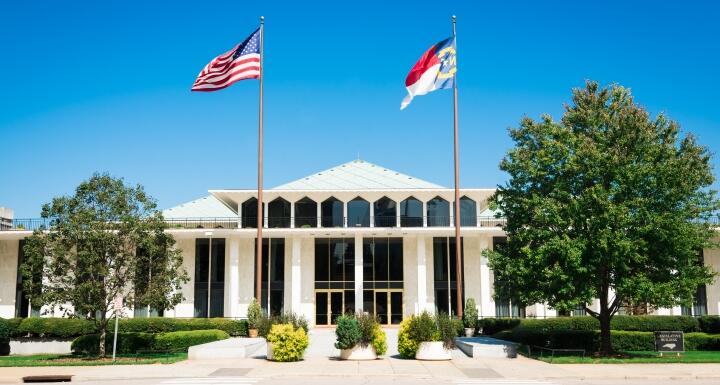Leaders of the North Carolina General Assembly signaled the effective end of the 2021 Long Session last week with the passage of SJR748, adjourning the longest session since at least 1965.
The Long Session certainly lived up to its name, spanning 199 legislative days and marking the first time in state history that a Regular Session was adjourned in a different year than it was convened. The General Assembly is scheduled to return April 4th-6th and May 4th-6th, although leadership in both the House and Senate have indicated they do not anticipate any substantive legislative action until the beginning of the Short Session on May 18th; just one day following primary elections.
The 2021 Long Session was marked by many bipartisan agreements, chief among them being the first comprehensive state budget in three years to be signed by Governor Roy Cooper. That budget provided historic investments in rural communities, pay raises and bonuses for state employees and retirees, and infrastructure improvements, such as water systems and bridge repair. The budget also included tax relief for all North Carolinians, including military retirees, who will no longer be taxed by the State on their pensions.
While the breakthrough of a budget agreement between legislative leaders and Governor Cooper dominated the headlines for much of the 2021 Long Session, there were also many other notable bipartisan agreements to come out of Jones Street since January 2021. In October, leaders of both chambers and the Governor announced an agreement on innovative energy legislation, House Bill 951, which would direct North Carolina to reduce its carbon emissions by 70% by 2030 and become net-carbon neutral by the year 2050 among many other provisions. This follows similar legislation passed by the General Assembly in 2017, which has led to explosive growth in the renewable energy sector in North Carolina.
Looking forward to the legislative Short Session that is set to begin May 18th, we anticipate lawmakers will want to tackle a targeted list of high-profile topics. Those items include sports wagering legislation, legalization of medical marijuana, and expansion of Medicaid; the latter has long been a policy goal for Governor Roy Cooper. The Legislature, in the 2021 budget, established an interim study committee to explore Medicaid expansion and other opportunities to increase healthcare coverage to North Carolinians. That committee began meeting regularly in March and is expected to submit a final report along with recommendations to the Legislature by the start of the Short Session.
House and Senate budget writers will also propose their adjustments for the 2022-2023 biennial budget during the 2022 Short Session. This legislation is customarily less comprehensive than the two-year, Long Session budget, as most of the controversial items, such as pay raises and tax changes, are essentially already settled for both fiscal years.
Keen observers will note that the bill filing deadlines set forth in the adjournment resolution occur even before the convening of the Short Session on May 18th. In our team's experience, the passing of bill filing deadlines before the official start of the session is unprecedented. We are taking that subtle scheduling nuance as a signal that the General Assembly expects to wrap up its business for the year on a condensed timeline, similar to that of the 2018 Short Session. With nearly a quarter of General Assembly members choosing either to not run for reelection, or announcing their intentions to run for a different office, there is little doubt that members will be eager to expeditiously dispose of the needed business in Raleigh, and hit the campaign trail.
Ward and Smith's Government Relations Team will continue to monitor General Assembly activity. We are committed to providing timely updates on the latest legislative developments that impact our clients and their businesses.









